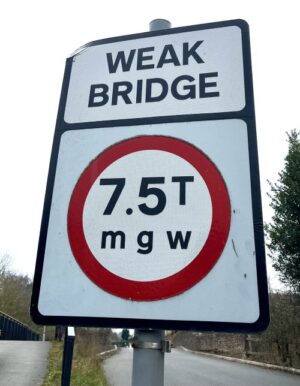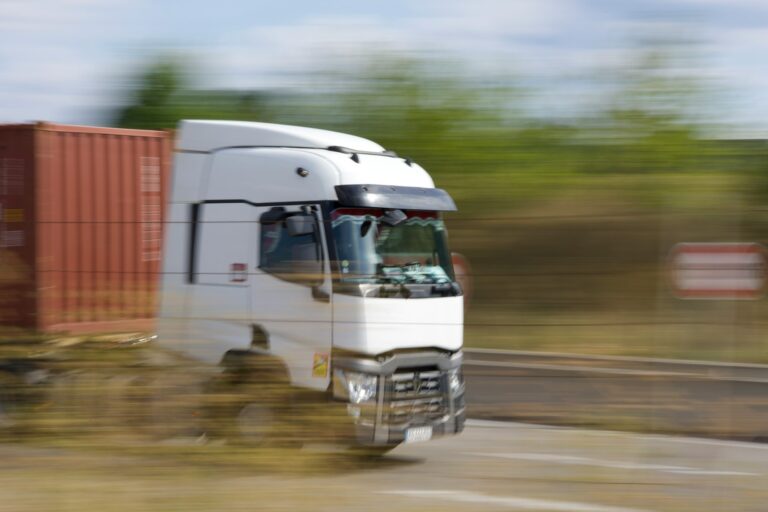When investing in waste management vehicles, one of the most common debates is hook loader vs skip lorry. Both have their place in the industry, but choosing the right vehicle depends on the type of work you do, the volume of waste handled, and the operational environment. This guide breaks down the strengths and limitations of each option, helping waste operators, skip hire firms, and fleet managers decide which is the most practical fit.
What Is a Hook Loader?
A hook loader (sometimes called a roll-on roll-off or RoRo truck) uses a hydraulic hook arm to lift and transport large containers. These containers are typically used for high-volume waste or heavy materials like demolition rubble. The key advantage lies in versatility: a single chassis can handle multiple container sizes and types, swapped in and out quickly on site.
Typical uses
- Bulk waste removal from construction or demolition sites
- Large commercial or industrial waste streams
- Transfer stations moving waste between depots and treatment facilities
For operators who need a complete package, hook loaders are often paired with bins, skips & containers designed for different waste streams.
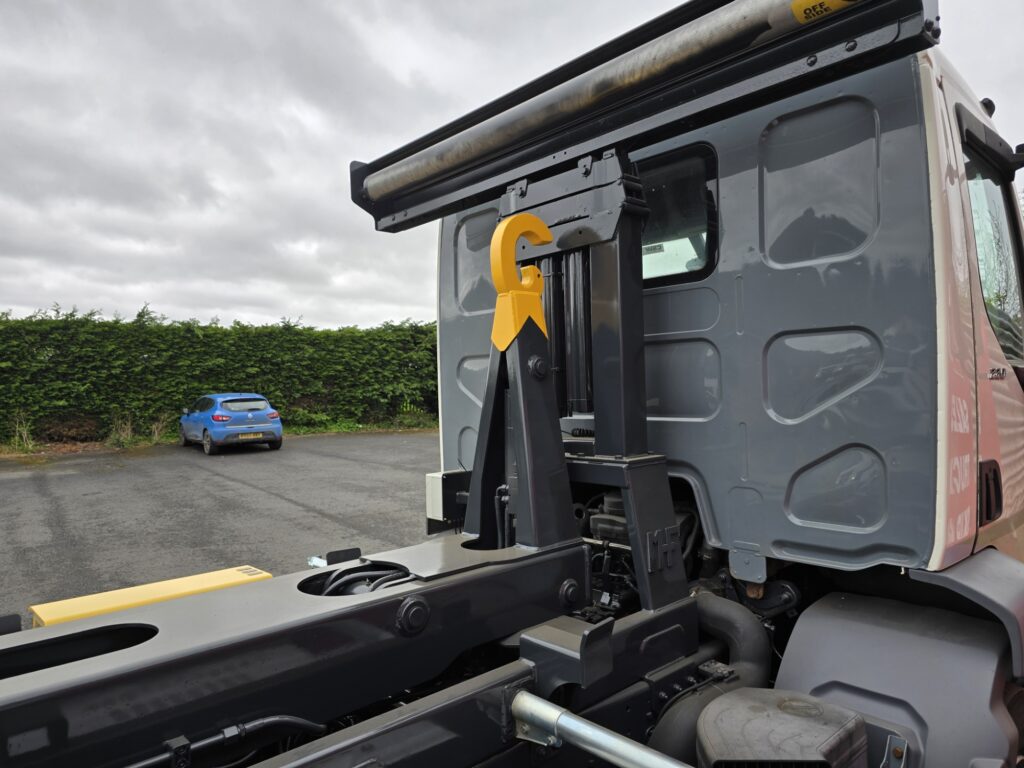
What Is a Skip Lorry?
A skip lorry (also known as a skip loader) is designed to carry open-topped skips, usually ranging from 2–16 cubic yards. Skips are lifted onto the lorry using hydraulic arms and chains. This system is well suited to smaller, more frequent waste collections in residential or light commercial settings.
Typical uses
- Household skip hire services
- Smaller construction and renovation jobs
- Regular waste collection for shops, offices, or workshops
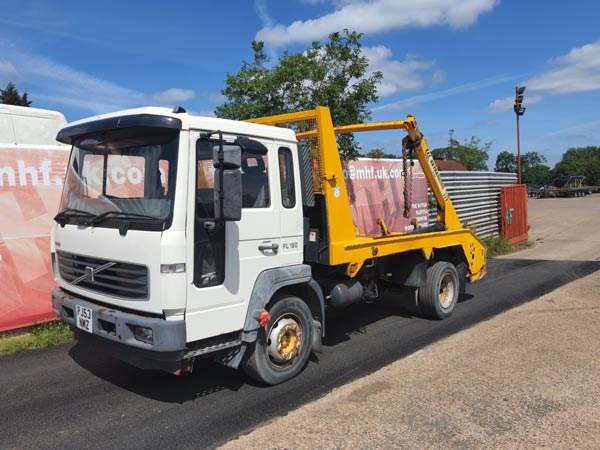
Hook Loader vs Skip Lorry: Key Comparisons
The decision between hook loader or skip lorry often comes down to three main factors: capacity, site access, and operational flexibility.
1. Capacity
- Hook loader: Containers can be 20–50 cubic yards or more, making them ideal for bulk waste.
- Skip lorry: Skips are smaller (2–16 cubic yards), better for frequent but lower-volume collections.
Verdict: For heavy-duty jobs with high volumes, the hook loader wins. For small to medium projects, skip lorries are more efficient.
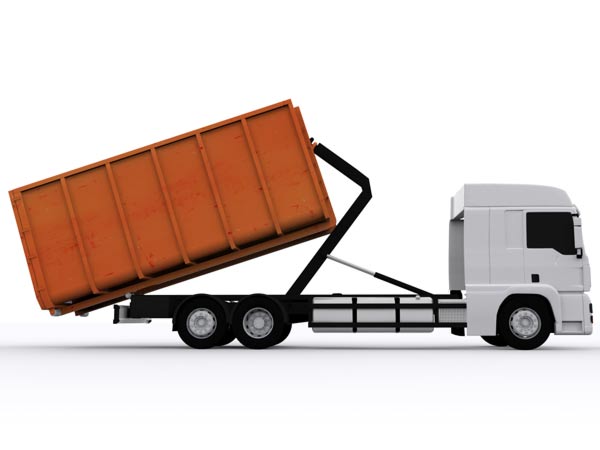
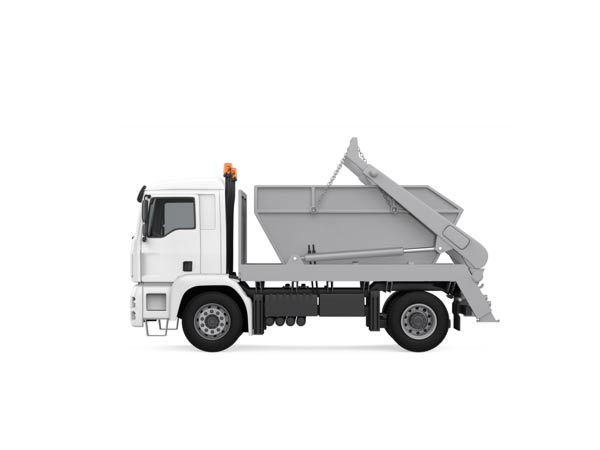
2. Site Access and Manoeuvrability
- Hook loader: Larger chassis, longer wheelbase, and bigger turning circle. Suited to open construction sites but less practical in tight urban streets.
- Skip lorry: Compact design makes them easier to manoeuvre through narrow residential roads and tight entrances.
Verdict: Skip lorries are better for domestic or urban work; hook loaders are better for open sites with space to operate.
3. Loading and Turnaround Time
- Hook loader: Containers can be swapped quickly without manual handling. However, sites need adequate space for loading and unloading.
- Skip lorry: Skips require more precise placement and sometimes additional time securing chains. But their smaller size makes them quick to position in restricted areas.
Verdict: Hook loaders are faster for bulk jobs; skip lorries are quicker for tight-space, small-volume work.
4. Flexibility and Container Options
- Hook loader: Can use a variety of container types — enclosed bins for hazardous waste, open containers for rubble, compactor units for municipal waste.
- Skip lorry: Limited to standard skip designs, although skips do vary in size.
Verdict: Hook loaders provide more flexibility for multi-purpose fleets. You’ll often find operators combining them with custom builds to tailor containers to specific contracts.
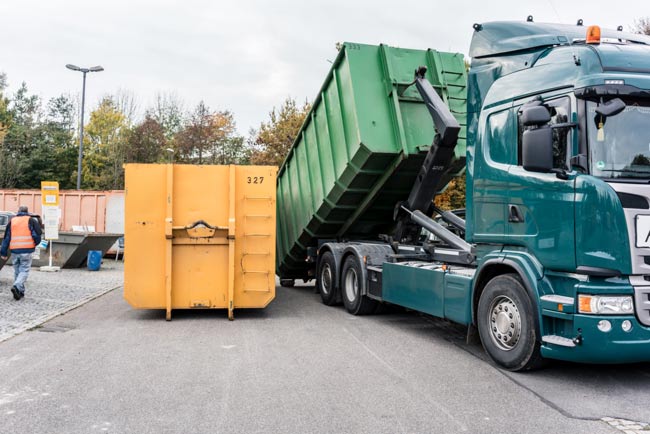
5. Cost and Investment
- Hook loader: Higher upfront cost due to larger chassis and hydraulics. Containers are also more expensive, but long-term savings can be made by running fewer vehicles with more interchangeable bins.
- Skip lorry: Lower purchase cost, easier to run for smaller businesses. Skips are cheaper and simpler to maintain.
Verdict: Skip lorries are more cost-effective for small-scale operators. Hook loaders make financial sense for larger fleets handling bulk waste. Regardless of choice, ensuring regular maintenance is essential to control downtime and repair costs.
Real-World Examples
- Skip hire company in a city: A skip lorry is the obvious choice. Access down narrow roads and driveways is essential, and smaller skips suit domestic jobs.
- Demolition contractor: A hook loader works best. The ability to remove 40–50 cubic yards of heavy rubble in one trip reduces downtime and keeps large projects moving.
- Mixed operator: Many larger firms run both, using skip lorries for residential work and hook loaders for commercial or construction contracts.
For either setup, having access to reliable parts helps keep vehicles running efficiently.
Operational Considerations
When comparing hook loader or skip lorry, it’s not just about the vehicle — compliance and safety also come into play.
- Weight limits: Overloading skips or containers risks fines and damage. Operators must know vehicle GVW (gross vehicle weight) and container capacities.
- Licensing: Both vehicles fall under HGV licensing, but operators need to check O-licence requirements and ensure compliance with inspections and maintenance schedules.
- Driver skills: Hook loaders often require more training to handle safely due to the larger chassis and container weight.
You can find more guidance on vehicle classes and roles in our Types of Lorry guide.
Advantages of Hook Loaders
- High-capacity containers (20–50+ cubic yards)
- Versatile container types (open, enclosed, compactors)
- Faster turnaround on bulk jobs
- Reduces trips, lowering fuel and labour costs
Advantages of Skip Lorries
- Compact and manoeuvrable in residential streets
- Lower vehicle and container investment
- Familiar system for domestic customers
- Ideal for frequent, smaller collections
Which Should You Choose?
Ultimately, the hook loader vs skip lorry decision depends on your workload:
- Choose a skip lorry if:
- Your business focuses on domestic skip hire
- You operate mainly in urban or residential areas
- You want a lower-cost entry into waste transport
- Choose a hook loader if:
- You handle large-scale construction or demolition projects
- You need container flexibility for different waste streams
- You want to reduce trips and improve efficiency on bulk jobs
For many waste operators, the best solution is a mixed fleet — running skip lorries for residential work and hook loaders for commercial and industrial contracts. Some operators also pair these vehicles with tippers to cover aggregates and site clearance work.
Hook Loader vs Skip Lorry: FAQs
What’s the difference between a hook loader and a skip lorry?
A hook loader uses a hydraulic hook arm to lift and transport large roll-on roll-off (RoRo) containers, making it suitable for bulk waste and heavy materials. A skip lorry carries smaller open-topped skips via chains and arms, ideal for frequent, lower-volume collections in domestic and light commercial settings.
Is a hook loader more expensive than a skip lorry?
Generally yes. Hook loaders typically require a larger chassis and heavier hydraulics, and the containers themselves cost more. For high-volume or demolition work, the efficiency gains (fewer trips) can offset those costs over time.
Which is better for domestic skip hire?
A skip lorry is usually the better choice. Its compact size and manoeuvrability suit narrow residential streets and driveways, and standard skip sizes align well with household and small-site jobs.
Can one operator run both hook loaders and skip lorries?
Yes. Many fleets run both to cover different contract types—skip lorries for residential and small commercial collections, and hook loaders for construction, demolition, and high-volume industrial waste.


